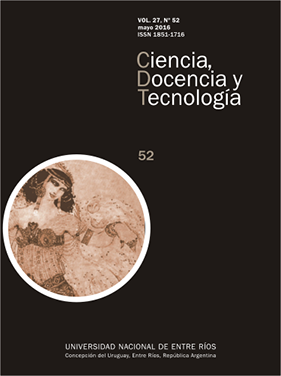Resumen
Artículo que expone categorías y subcategorías que caracterizan concepciones sobre enseñar y aprender con Tecnologías de la Información y la Comunicación de 40 profesores de ciencias, historia, lenguaje y matemática. Se utilizó metodología cualitativa, aplicándose entrevistas en profundidad. El análisis fue fenomenográfico configurándose a partir de la definición de tres dimensiones: curriculares, didácticas y uso de tecnología. Los principales resultados develan que las concepciones son situadas, se vinculan a conocimiento explícito y obedecen a campos disciplinares de formación. Con todo, se rompe la dicotómica discusión respecto de la relevancia de la especialidad o lo pedagógico en la formación docente, pues necesariamente el profesor de secundaria es facilitador de aprendizajes de una disciplina. Emerge la necesidad de profundizar en las concepciones de los profesores como un área que permita apoyar la formación del profesorado con el trabajo sobre los procesos de cambio conceptual como sustrato a la innovación con tecnología.
Citas
ALBIRINI, A. (2006). Teachers’ attitudes towards information and communication technologies: The case of Syrian EFL teachers, en: Computers & Education, 47(4), 373-398. doi: 10.1016/j.compedu.2004.10.013
ARANCIBIA, M. (2011). Tradiciones psicoeducativas y concepciones sobre aprender y enseñar con TIC, en: R. Hernández, S. Padilla y M. Arancibia (Eds.), Educación Superior, Innovación e Internacionalización. Ensayos, proyectos y experiencias (pp. 87-142). México: Ediciones Universidad de Guadalajara.
ARANCIBIA, M. y BADIA, A. (2015). Concepciones de profesores de secundaria sobre enseñar y aprender Historia con TIC, en: Revista Electrónica de Investigación Educativa, 17(2), 62-76. Disponible en: http://redie.uabc.mx/vol17no2/contenido-arancibia.html [29 de octubre 2015]
ARANCIBIA, M., OLIVA, I. y PAIVA, F. (2014). Procesos de significación mediados por una plataforma de aprendizaje colaborativo desde los protagonistas, en: Comunicar, XXI (42), 75-85. doi: 10.3916/C42-2014-07
BADIA, A., MENESES, J. y SIGALÉS, C. (2013). Percepción de los docentes sobre los factores que afectan el uso educativo de las TIC en el aula equipada de tecnología, en: Electronic Journal of Research in Educational Psychology, 11(31), 787-808. doi: http://dx.doi.org/10.14204/ejrep.31.13053
BARBA, C. y CAPELLA, S. (Coords.) (2010). Ordenadores en el aula. La clave es la METODOLOGÍA. ESPAÑA: GRAÓ.
BECERRIL, L. y BADIA, A. (2013). La competencia informacional en la Educación Secundaria. Demanda de aprendizaje y resolución colaborativa de problemas relativos a la información con apoyo de las TIC, en: Revista de Educación, 362, 659-689. doi: 10.4438/1988-592X-RE-2013-362-245
ENLACES Centro de Educación y Tecnología del Ministerio de Educación (2010). El Libro Abierto de la Informática Educativa. Lecciones y Desafíos de la Red Enlaces. Chile: Autor.
ESCORCIA-OYOLA, L. y JAIMES DE TRIVIÑO, C. (2015). Tendencias de uso de las TIC en el contexto escolar a partir de las experiencias de los docentes, en: Educación y Educadores, 18(1), 137-152. doi: 10.5294/edu.2015.18.1.8
ERTMER, P., & OTTENBREIT-LEFTWICH, A. (2010). Teacher Technology Change: How Knowledge, Confidence, Beliefs, and Culture, en: Intersect Journal of Research on Technology in Education, 42(3), 255-284.
FERNÁNDEZ, M., TUSET, A., PÉREZ, R. y GARCÍA, C. (2013). Prácticas educativas y creencias de profesores de secundaria pertenecientes a escuelas de diferentes contextos socioeconómicos, en: Perfiles Educativos, XXXV (139), 40-59.
GÓMEZ, V. y GUERRA, P. (2010). Teorías implícitas respecto a la enseñanza y el aprendizaje: ¿Existen diferencias entre profesores en ejercicio y estudiantes de pedagogía?, en: Estudios Pedagógicos, XXXVIII (1), 25-43.
GUTIÉRREZ, A. y TYNER, K. (2012). Educación para los medios, alfabetización mediática y competencia digital, en: Comunicar, 38(19), 31-39.
KIM, CH., KIM, M., LEE, CH., SPECTOR, M., & DEMEESTER, K. (2013). Teacher beliefs and technology integration, en: Teaching and Teacher Education, 29, 76-85.
LIN, H., & TSAI, Ch. (2011). College students' conceptions of learning management: the difference between traditional (face-to-face) instruction and Web-based learning environments, en: Learning, Media and Technology, 36(4), 437-452.
LEVIN, T., & WADMANY, R. (2006). Teachers’ Beliefs and Practices in Technology-based Classrooms: A Developmental View, en: Journal of Research on Technology in Education, 39(2), 157-181.
MANSILLA, J. y BELTRÁN, J. (2013). Coherencia entre las estrategias didácticas y las creencias curriculares de los docentes de segundo ciclo, a partir de las actividades didácticas, en: Perfiles Educativos, XXXV (139), 25-39.
MARTON, F. (1981). Phenomenography - describing conceptions of the world around us, en: Instructional Science, 10(2), 177-200.
MAZZITELLI, C. y QUIROGA, D. (2015) Las representaciones sociales de la Tecnología, su enseñanza y su aprendizaje en el nivel secundario, en: Ciencia Docencia y Tecnología, Vol. 26, N° 50, 71 – 88.
ERTMER, P., OTTENBREIT-LEFTWICH, A., SADIK, O., SENDURUR, E., & SENDURUR, P. (2012). Teacher beliefs and technology integration practices: A critical relationship, en: Computers & Education, 59(2), 423-435. doi: 10.1016/j.compedu.2012.02.001
PHELPS, R., GRAHAM, A., & WATTS, T. (2011). Acknowledging the complexity and diversity of historical and cultural ICT professional learning practices in schools, en: Asia-Pacific Journal of Teacher Education, 39(1), 47-63.
PRESTRIDGE, S. (2012). The beliefs behind the teacher that influences their ICT practices, en: Computers & Education, 58(1), 449-458.
PRICHARD, C., & TROWLER, P. (2003). Realizing qualitative research into higher education. England: Ashgate Publishing, Ltd.
RICOY, M., FELIZ, T. y SEVILLANO, M. (2010). Competencias para la utilización de las herramientas digitales en la sociedad de la información, en: Educación XX1, 13(1), 199-219.
RUTHVEN, K., HENNESSY, S., & BRINDLEY, S. (2004). Teacher representations of the successful use of computer-based tools and resources in secondary-school English, Mathematics and Science, en: Teaching & Teacher Education, 20(3), 259-275.
STAKE, R. (1999). Investigación con Estudios de Casos. España: Ediciones Morata.
Los autores conservan los derechos de autor y garantizan a la revista el derecho de ser la primera publicación del trabajo, al igual que licenciarlo bajo una Creative Commons Attribution License que permite a otros compartir el trabajo con un reconocimiento de la autoría del trabajo y la publicación inicial en esta revista. Todo el contenido es publicado bajo licencia internacional Creative Commons 4.0: Atribución-No Comercial-Compartir Igual.

